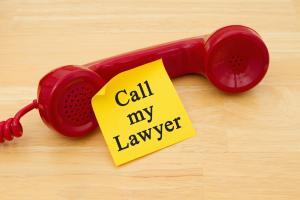Jail Phone Calls to Lawyers Can Be Used as Evidence
Get Legal Help Today
Find the right lawyer for your legal issue.
Secured with SHA-256 Encryption
Mary Martin
Published Legal Expert
Mary Martin has been a legal writer and editor for over 20 years, responsible for ensuring that content is straightforward, correct, and helpful for the consumer. In addition, she worked on writing monthly newsletter columns for media, lawyers, and consumers. Ms. Martin also has experience with internal staff and HR operations. Mary was employed for almost 30 years by the nationwide legal publi...
Published Legal Expert
UPDATED: Oct 23, 2024
It’s all about you. We want to help you make the right legal decisions.
We strive to help you make confident insurance and legal decisions. Finding trusted and reliable insurance quotes and legal advice should be easy. This doesn’t influence our content. Our opinions are our own.
Editorial Guidelines: We are a free online resource for anyone interested in learning more about legal topics and insurance. Our goal is to be an objective, third-party resource for everything legal and insurance related. We update our site regularly, and all content is reviewed by experts.
UPDATED: Oct 23, 2024
It’s all about you. We want to help you make the right legal decisions.
We strive to help you make confident insurance and legal decisions. Finding trusted and reliable insurance quotes and legal advice should be easy. This doesn’t influence our content. Our opinions are our own.
On This Page

As the New York Times notes,
Conversations between criminal defendants and their lawyers about their cases are typically protected from disclosure, so long as there is no discussion of a continuing or future crime or fraudulent act. This privacy, known as attorney-client privilege, helps guarantee the Fifth Amendment right against self-incrimination and the Sixth Amendment right to legal counsel.
This means that the client can refuse to disclose — and can prevent any other person (including the lawyer) from disclosing — confidential communications between the client and lawyer.
“Full and Frank” Disclosures
The US Supreme Court noted in the case of Upjohn Co. v. United States that the privilege is intended to encourage clients to make “full and frank” disclosures to their lawyers, who can then be better able to provide candid advice and effective representation to their clients.
The privilege usually applies when:
- The person claiming it is either the lawyer’s client or seeking to become a client.
- The person to whom the communication is made is either a member of a state bar association or works for such a member.
- The communication is made in the context of seeking legal advice.
There are several exceptions to the privilege, so that it won’t usually apply when:
- The communication was made in the presence of people who were neither the lawyer or the client.
- The client disclosed the communications to others who weren’t lawyers.
- The communication was made for the purpose of committing a tort (civil wrong) or crime.
- The client waived the privilege.
For example, as Deadline reported,
President Donald Trump’s legal team decided… to waive attorney-client privilege claims on a Michael Cohen/Trump recording that reportedly discusses a payoff to Karen McDougal, a former Playboy model who claimed a long affair with the president in 2006.
Non-Legal Advice
Also, the privilege may not apply if the lawyer isn’t acting as a lawyer but is acting as a business advisor or in some other non-legal role.
As CNBC noted, a review of nearly 900,000 files and other items “seized from President Donald Trump’s former lawyer Michael Cohen by the FBI has found that just a tiny fraction should be withheld from federal prosecutors because of attorney-client privilege.”
As Business Insider discussed,
“For a person who claims to be a lawyer, the minuscule amount of allegedly privileged matter is surprising, and what it tells us is that Cohen wasn’t acting as a lawyer very often,” a former federal prosecutor told Business Insider. ” He was doing something else.”
Phone Calls from Jail
As the Times notes, some clients may have difficulty holding private communications with their lawyers.
In New Orleans, for example,
all calls made by jail inmates to their lawyer’s cellphone (and to anyone else’s) are recorded and archived in a system that law enforcement officials can access. As a result, if a defendant speaks to his lawyer about evidence against him, or about the sort of plea-bargain offers he would be willing to accept, a prosecutor might be listening in.
At least eight other city jails surveyed by Court Watch NOLA also record calls between clients and lawyers.
Clients and lawyers can meet in person in order to protect their attorney-client privilege, but this may not be practical for public defenders with a heavy workload.
Find the right lawyer for your legal issue.
Secured with SHA-256 Encryption
Mary Martin
Published Legal Expert
Mary Martin has been a legal writer and editor for over 20 years, responsible for ensuring that content is straightforward, correct, and helpful for the consumer. In addition, she worked on writing monthly newsletter columns for media, lawyers, and consumers. Ms. Martin also has experience with internal staff and HR operations. Mary was employed for almost 30 years by the nationwide legal publi...
Published Legal Expert
Editorial Guidelines: We are a free online resource for anyone interested in learning more about legal topics and insurance. Our goal is to be an objective, third-party resource for everything legal and insurance related. We update our site regularly, and all content is reviewed by experts.
